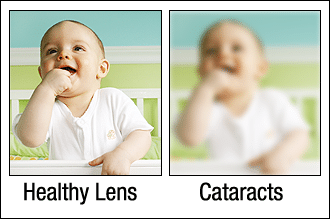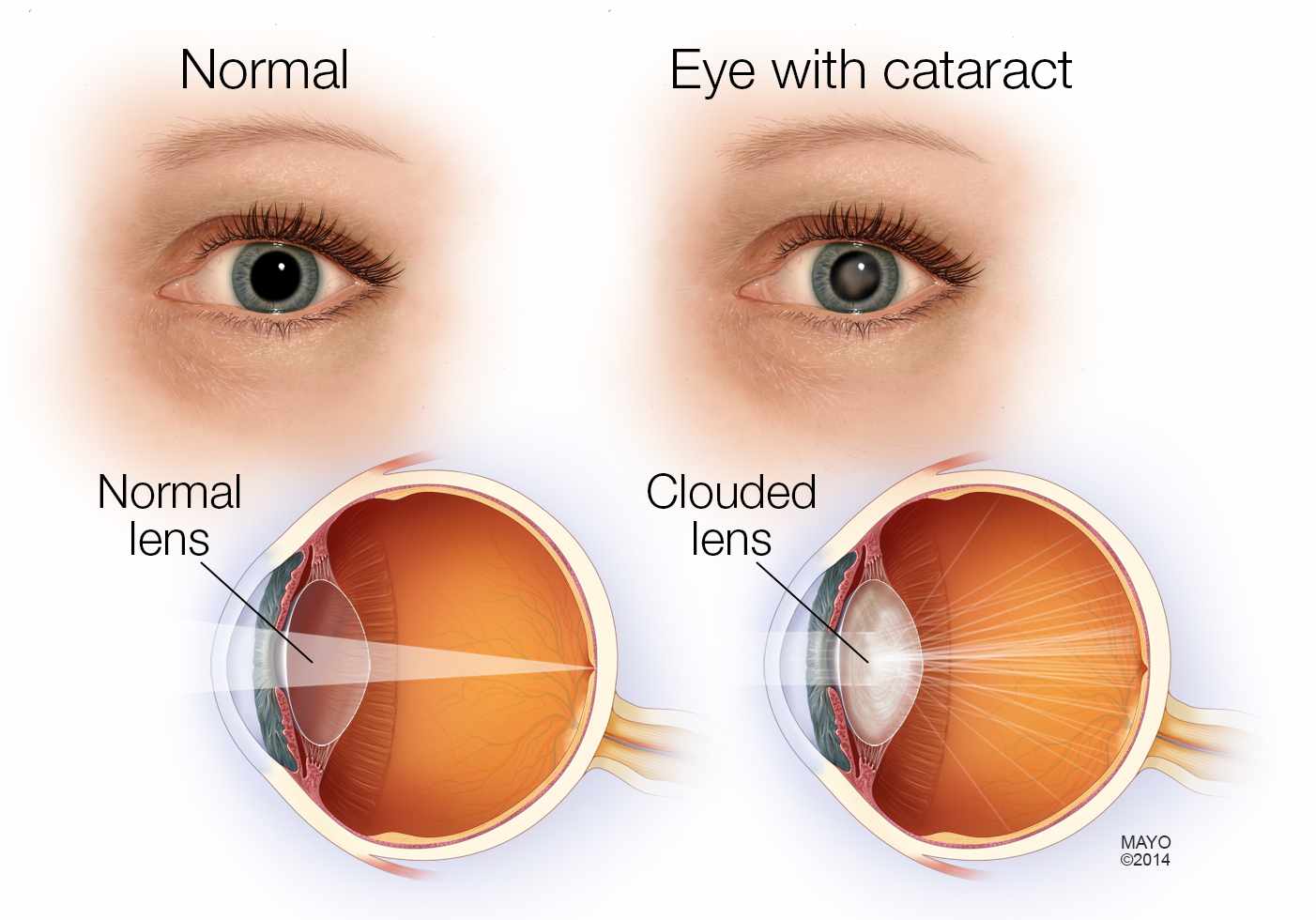Cataracts
A cataract is a clouding of the clear lens in the eye, and is one of the leading causes of vision impairment. While cataracts most commonly occur in those who are older, they can develop in younger people as well. Some babies can even be born with a cataract.
Due to its association with ageing, eventually everyone will develop a cataract if they live long enough. By the age of 80, almost all of us will have some degree of cataract formation.
To find out if you have cataracts, please call us on 3345 3383 to make an appointment!

What causes cataracts?
The lens inside the eye works much like a camera lens, adjusting the eye’s focus to let us see things clearly both up close and far away.
The lens is mostly made of water and protein. However as we age, some of the proteins may clump together and start to cloud a small area of the lens. Over time, it may grow larger and cloud more of the lens, making it harder to see.

Signs Of Cataracts
In its early stages, a cataract may only cause slight vision problems. However some of the common signs associated with advanced cataracts include:
- Blurred vision
- Glare sensitivity
- Reduced night vision
- A feeling of looking through a veil or curtain
- Fading or ‘yellowing’ of colours
- Distortion in the affected eye
- Double vision
Typically, people with cataracts complain about difficulty with:
- Reading, especially in dim light
- Recognising faces or facial expressions
- Driving at night
Risk factors
Those most at risk include people who have:
- A family history of the eye condition
- Exposed their eyes to sunlight without protection over a long period
- Diabetes
- Smoked for a period of time
- Excessive alcohol intake
- High blood pressure
- Had an previous eye injury or prolonged inflammation
- Previous eye surgery
- Prolonged exposure to x-rays or radiotherapy
- Poor nutrition
- Certain medications such as steroids
Call us on 07 3345 3383 or book online today!
How do I know if I have cataracts?
If your vision isn’t what it used to be, it’s a good idea to make an appointment with an optometrist who can diagnose the problem with an eye examination.
Please feel free to call us on 3345 3383 to make an appointment.
The optometrist will look at the appearance of your eye and retina, check for short sightedness and examine your eye with a slit lamp, which shows the location and pattern of the cataract under higher magnification. If there are concerns regarding cataracts, we may refer you to a ophthalmologist to consider further investigation and possibly surgery.
How can you slow cataract development?
Cataract formation can be slowed down through a number of lifestyle changes including:
- Sun protection. Wear protective sunglasses and a wide brimmed hat when outdoors to protect the eyes from harmful sunlight exposure.
- Quit smoking
- Reduce alcohol intake
- Eat a healthy diet. Diets containing lots of fruit and vegetables contain plenty of vitamins, minerals and antioxidants that provide the lens with the nutrients to protect from cataract formation.
- Vitamin supplements. Supplements are a good alternative if diets cannot be adjusted. Below are some examples of foods that provide the helpful nutrients.
We offer a wide variety of anti-reflective and polarised progressive lenses and sunglasses to protect the eyes from developing cataracts. Please ask one of our friendly staff for assistance!
Cataract treatment
Treatment for cataracts depend on how far they’ve developed and how much they affect vision:
- Glasses. Elderly may use stronger bifocals, increased magnification or other visual aids to improve vision in earlier stages.
- IOL surgery. The cataract-containing lens is surgically replaced with clear, plastic intraocular implants by making a small incision into the lens capsule.
Cataract surgery is very safe and is done under local anaesthetic, requiring no stitches. Cataracts do not come back after surgery. More than 180,000 cataract operations are performed every year, and there are high success rates in restoring distance vision close to normal within a few days. You may still need low strength reading glasses for help at near. *Men who take medications for prostate problems may not be suitable for cataract surgery as the drugs can cause intra-operative floppy iris syndrome (IFIS) during a cataract procedure where the lens won’t be held in place properly in the eye. The only side effect of surgery that may arise is the lens capsule surrounding the IOL may become cloudy – this can be fixed with laser treatment.
After surgery there are some post-operative care instructions:
- Use eye drops for several weeks to prevent infection and inflammation
- Avoid strenuous activity, heavy lifting or bending over
- Avoid eye rubbing
- Wear protective eye mask when sleeping
- Glasses for near work if required, especially with presbyopia
Please feel free to make an appointment on 3345 3383 for a glasses assessment.